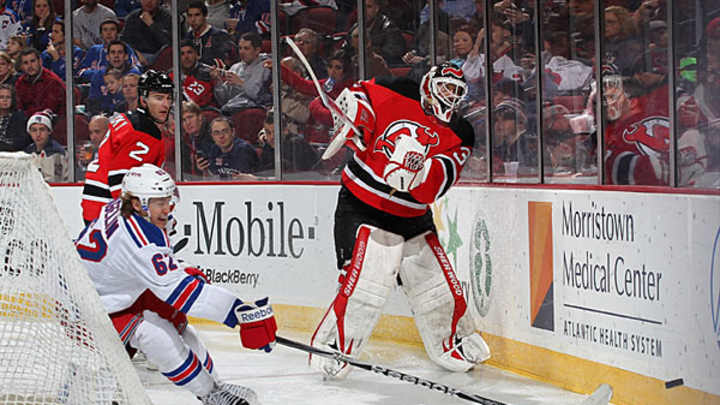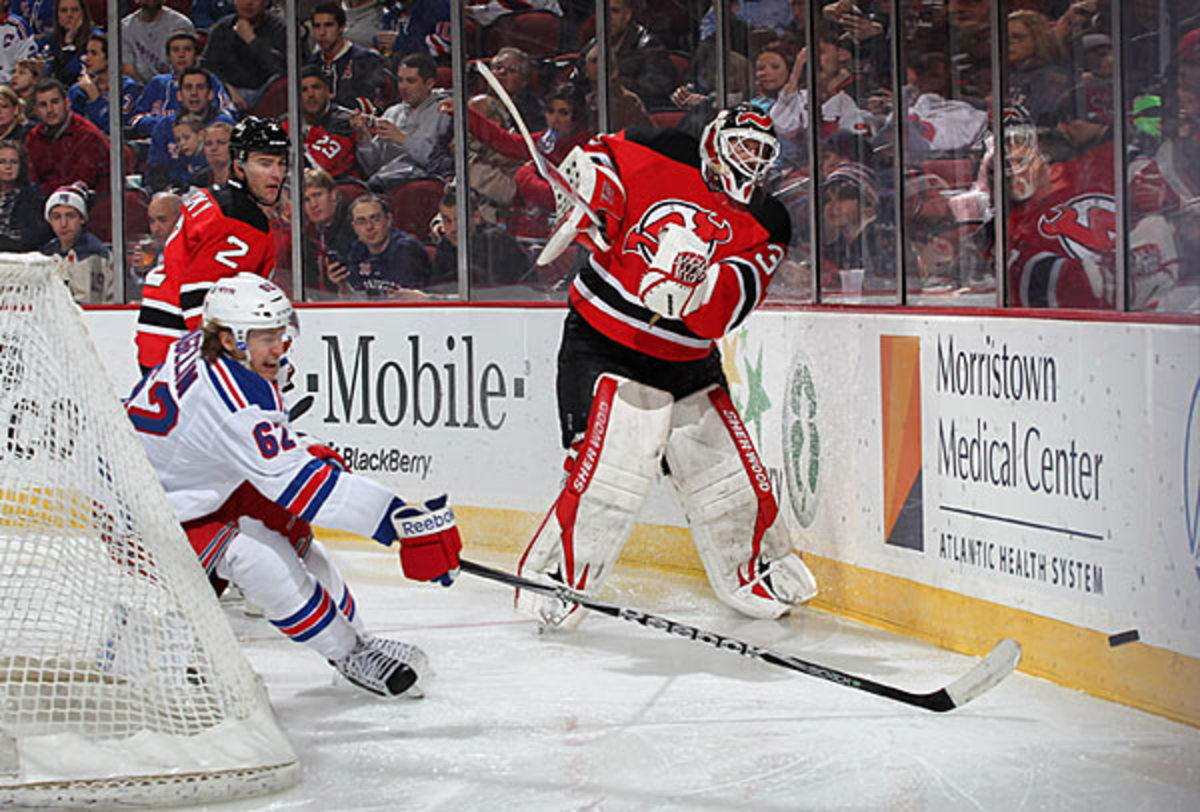GMs to talk trapezoid, OT extension

Restricting a goaltender's ability to play the puck has amounted to mere punishment for having the skill. (Andy Marlin/NHLI via Getty Images)

By Stu Hackel
On Thursday, we discussed the upcoming GMs meeting and the proposal by some to at least discuss restoring the two-line offside pass in the name of increased player safety. There are other items on the agenda at their Boca Raton, Florida gathering that starts on Monday, and while nothing cataclysmic is expected to come out of their deliberations -- at least nothing as historic as the proposal of what became Rule 48 two years ago, as well as the strengthening of that rule and new concern for a safer game last year -- some interesting tweaks will certainly get an airing.
One of them will be the elimination of the trapezoid behind the net. This rule came in with the package of post-lockout rules that was designed to open and speed up the game, but it was not really cut from the same cloth. The idea was dreamed up when during the Dead Puck Era when the two-line offside pass kept the game so congested that the only way to regularly get some pressure into the offensive zone was to play dump and chase. The problem was that defenders could hold up the forecheckers and stickhandling goalies like Marty Brodeur had become adept at getting the shoot-in and shooting it right back out before the attacking team could retrieve the puck.
Under those conditions it made some sense to restrict the area behind the net where goalies could play the puck, and give attacking teams a chance to establish a forecheck. But the new rules cracked down on obstruction by defenders and also opened up the neutral zone, and that really made that rule change somewhat unnecessary. Plus, some didn't like the fact that it penalized a skill; where netminders once were awkward puckhandlers, some had developed their ability to handle it quite well (to the point where they could gather it in and shoot it down the ice into an empty net for a goal). Why penalize that talent?
The trapezoid went into effect anyway and has had the added negative effect of goalies being unable to assist their defensemen in clearing the puck from the zone after shoot-ins. Hard forechecking forwards have made d-men "eat glass" many times in the last six-plus seasons whereas a goalie might have gotten to the puck first and prevented that collision from taking place.
The NHL tested the elimination of the trapezoid during last summer's Research and Development Camp with junior players, and Brendan Shanahan noted that goalies still didn't have time to play the puck because the defensemen couldn't hold up the forwards.
Well, if that's the case, what is the harm in taking the trapezoid out now? Shanahan acknowledged that it was only one test and opportunities may arise in a game where a goalie could venture to the corner to play the puck without pressure from opposing forwards. So why not let that happen? Why not let the goalie take that risk and reward him for the skill he has developed to play the puck? If he makes a mistake by leaving the net unguarded, that's on him.
By the way, Kerry Fraser wrote about the trapezoid last May on his TSN.ca blog and it's worth reading, as all of his blog posts are.
Now, while we like skill, we like it in its proper context, that being in the course of a game. When you take the skill out of that context and isolate it, as in the shootout, it is far less impressive. Making skillful moves while being defended and at game pace is truly exciting, as opposed to what happens once overtime ends.
So we're happy to hear that another rule that might be discussed is the proposal by Detroit's GM Ken Holland to add five minutes of OT if the four-on-four period goes scoreless and playing the additional five at three-on-three. That's something we've advocated for a long time (even well before this post). The more that actual hockey settles games as opposed to a skills competition, the better.
"Through Thursday, 13.54 per cent of NHL games were decided in shootouts this year, the second-highest total since the league introduced the format in 2005-06," Eric Duhatschek writes in Friday's Globe and Mail, an article for which he interviewed Holland. "If successful, the measure would further devalue the shootout in the NHL standings – which can only be a good thing to all the purists and old fogeys out there. The GMs made a similar, but far-less radical shift a couple of years back, when revamping the criteria for playoff qualification.
I plead guilty here on both counts of being a purist (and not a tourist) and an old fogey. (Better term: "experienced.")
"It used to be the first tie-breaker for teams tied in the standings at the end of the regular season was total wins. Holland, and a handful of like-minded peers, convinced the league that only regulation and overtime wins should count for such an important matter – and no one should slip into the playoffs because of an ability to win games on penalty shots," Duhatschek continues.
There are other ideas that may be discussed (and Pierre LeBrun on ESPN.com has a summary of them on his blog). But as for big changes, or maybe even little ones, actually being proposed and coming out of the meeting, it seems at the moment that this could be a relatively quiet get-together.
By the way, in his Globe and Mail story, Duhatscheck quotes Holland at length on why he no longer advocates revamping the NHL points system, so that regulation victories would be worth three; overtime or shootout victories would earn two; overtime and shootout losses would be rewarded with a single point; and regulation losses count for zero. Essentially, Holland's position is that the races are so compelling now, with so much uncertainty and drama that you run the risk of disturbing that and creating more separation between teams.
The 3-2-1-0 system has its advocates, and when you see how difficult it is for teams that fall behind early in the standings to make up ground in the second half and actually make the playoffs because of the "loser point," that's one reason to consider a change. But I've never found it particularly appealing because, if I ruled the world, I'd rather be rid of the shootouts, add more overtime, and if the game isn't settled by then, call it a tie and stick with 2-1-0.
That's the old fogey version (which is still the best). Here's another one I like.
COMMENTING GUIDELINES: We encourage engaging, diverse and meaningful commentary and hope you will join the discussion. We also encourage, but do not require, that you use your real name. Please keep comments on-topic and relevant to the original post. To foster healthy discussion, we will review all comments BEFORE they are posted. We expect a basic level of civility toward each other and the subjects of this blog. Disagreements are fine, but mutual respect is a must. Comments will not be approved if they contain profanity (including the use of punctuation marks instead of letters); any abusive language or personal attacks including insults, name-calling, threats, harassment, libel and slander; hateful, racist, sexist, religious or ethnically offensive language; or efforts to promote commercial products or solicitations of any kind, including links that drive traffic to your own website. Flagrant or repeat offenders run the risk of being banned from commenting.
